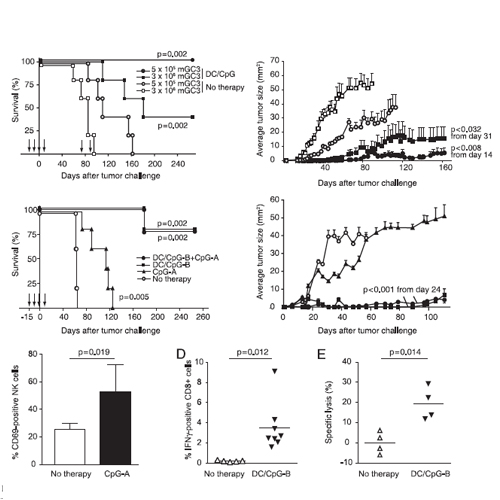Efficient Eradication of Subcutaneous but Not of Autochthonous Gastric Tumors by Adoptive T Cell Transfer in an SV40 T Antigen Mouse Model
15-Aug-2010
The Journal of Immunology, 2010, doi: 10.4049/jimmunol.0903231, vol. 185 no. 4 2580-2588 published on 15.08.2010
The Journal of Immunology, online article
The Journal of Immunology, online article
In stomach cancer, there is a need for new therapeutic strategies, in particular for the treatment of unresectable tumors and micrometastases. We investigated the efficacy of immunotherapy in an autochthonous model of gastric cancer, the CEA424-SV40 T Ag (TAg) transgenic mice. Treatment efficacy against both the autochthonous tumors and s.c. tumors induced by the derived cell line mGC3 were assessed. In wild-type mice, a dendritic cell vaccine loaded with irradiated tumor cells combined with CpG oligonucleotides induced efficient cytotoxic T cell and memory responses against mGC3 s.c. tumors. In contrast, neither s.c. nor autochthonous tumors responded to vaccination in CEA424-SV40 TAg mice, indicating tolerance to the SV40 TAg. To examine whether tumors in these mice were principally accessible to immunotherapy, splenocytes from immune wild-type mice were adoptively transferred into CEA424-SV40 TAg transgenic mice. Treated mice showed complete regression of the s.c. tumors associated with intratumoral infiltrates of CD8 and CD4 T cells. In contrast, the autochthonous gastric tumors in the same mice were poorly infiltrated and did not regress. Thus, even in the presence of an active anti-tumoral T cell response, autochthonous gastric tumors do not respond to immunotherapy. This is the first comparison of the efficacy of adoptive T cell transfer between transplanted s.c. tumors and autochthonous tumors in the same animals. Our results suggest that in gastric cancer patients, even a strong anti-tumor T cell response will not efficiently penetrate the tumor in the absence of additional therapeutic strategies targeting the tumor microenvironment.











